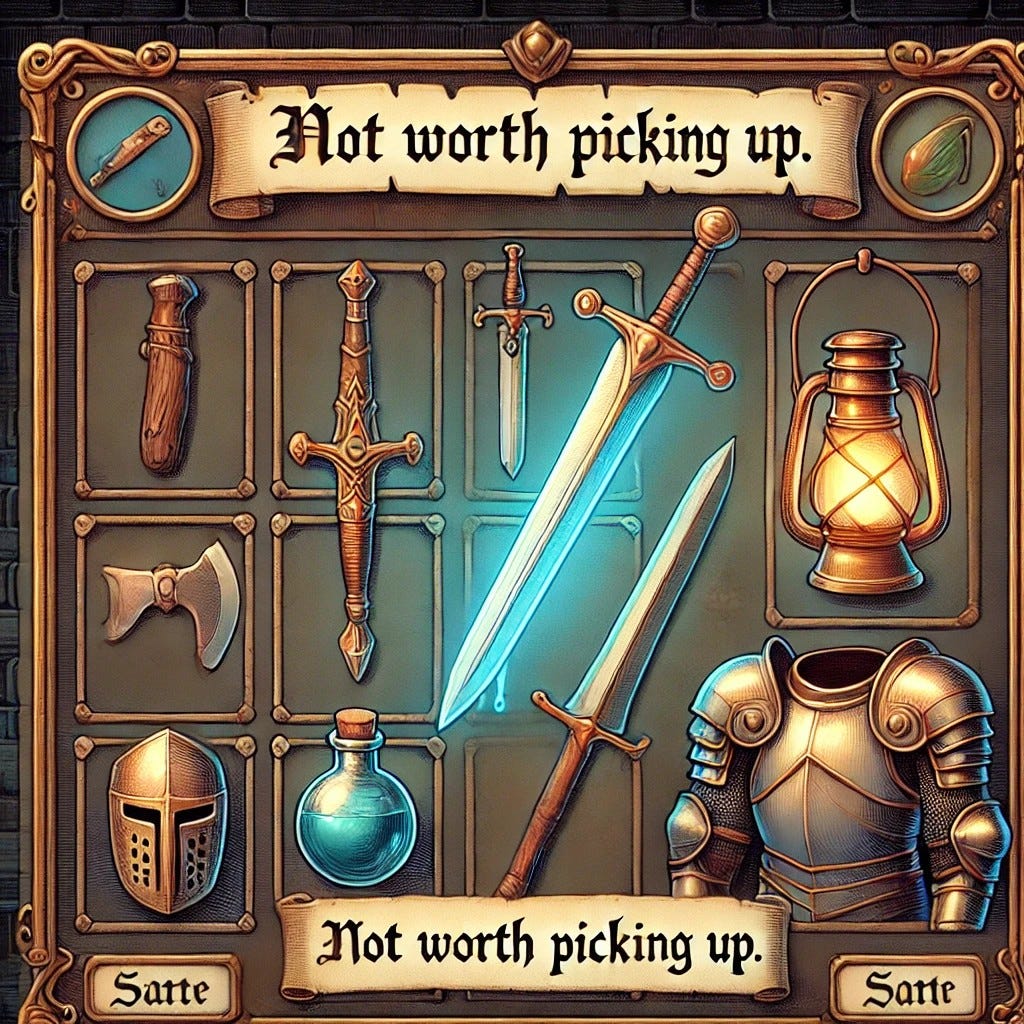Contempt
Should you add a cudgel to your inventory?
Loyal readers, I have a confession to make. I have been working on a book. The working title is All the Feels. (I’m still working on the subtitle. Suggestions welcome.) The goal is to provide an evolutionary explanation for every feeling that humans can experience. All of them.1 I assume that each feeling has an evolved function and that, in order to do its job, the feeling measures something either in the world or in the body and then motivates something, usually behavior. So the feeling that you need to pee measures how much room is left in the bladder and motivates, well, urinating.
I have been posting some of these feels to this Substack over the last year or so. In total, there will be about 80 feels, of which maybe a dozen will be posted here. So far, I’ve covered the need to breathe, being bored, being tickled, and a few others. This post is about the feeling of contempt.
For each feel, I present the adaptive problem being solved, what the feel measures, what it motivates, and its quality (positive or negative). I have divided the feels into Kingdoms, Phyla, and Classes, to organize them.2 I preview that system below. The links you see in this post with citations would be endnotes in the book.
Here at The Living Fossils, we don’t ask for much. We keep it free and are happy to do so. We—well, I—have a request. Let me know what you think! Would you be interested in reading—and by “reading” of course I mean “buying”—the book once it’s out? Please let us know!
CONTEMPTProblem: Responding to people who add little value.
Measure: The (low) value another person has for social relationships.
Quantity: Evidence of others’ abilities, traits, beliefs, especially incompetence and immorality.
Motivation: Reduce/avoid/end social interactions.
Quality: Negative.
Kingdom: Social. Phylum: Competition.
I am not proud of the time I have spent playing video games, but playing with my friends was a pillar of support during Covid lockdowns, so I don’t actually feel all that bad.
Also, video games provide an intuitive way to talk about contempt.
One of my favorite games was Skyrim, a swords-and-sorcery adventure in an enormous world with dangerous dragons, challenging puzzles, and engaging storylines.
Your character starts the game at level one, an escaping prisoner with virtually nothing. For this reason, anything you encounter is worth picking up and storing in one of your limited inventory spaces. That cudgel does more damage than my unarmed attack.
As you progress in the game, you acquire new items, many of them magical in some way: a plus-one sword, for instance, the “plus one” denoting the weapon deals one additional hit point of damage because it’s magical.
Eventually, equipped with enchanted weapons, armor, and accessories, you scoff at a cudgel. If you were to defeat a brigand and she drops a cudgel after the fight… pffft. For a Level 35 Warrior, it’s not worth picking up and wasting an inventory spot. You just roll right past it… with contempt.
Human social lives are like Skyrim and similar games.3 In these games, you only have one slot for headgear, whether a helmet, crown, diadem, or other head covering. In many cultures, mating is, more or less, like this: you can only fill your “mateship” slot with one person though, of course, it’s not quite so simple. This limitation means that you must act strategically and with great care in how you fill the slot.
Each part of our social lives, like a character’s inventory, has a capacity. Each of us only has so much time in the day, so we have to fill, say, our friendship slots carefully, making the most out of them. From an evolutionary point of view, humans—and other species—should be designed to make good decisions about how to fill them.
Contempt measures the degree to which a person is more like a cudgel than a magic sword. We feel contempt when someone behaves in a way that suggests that they are incompetent in some relevant domain or lack some valued trait, especially as it pertains to morality and integrity.
For instance, research4 has shown that people feel contempt—more than, say, anger or fear—for hypotheticals such as “a person steals a purse from a blind person,” “a 16-year old refuses to give up his/her seat on the bus to a crippled old lady,” or “a man comes home drunk and beats his wife.”5 Contempt is not restricted to such moral failings. Research participants also reported contempt in the context of examples of incompetence, such as “A person who tries to use large words to sound smart, but mispronounces them.” In contrast, people reported almost no contempt for items such as “A cleaning person, who thinks no one is watching, sits in the chair of the company president,” and “A salesman addresses someone by his/her first name after just meeting him/her.”
There are, as far as social life goes, various ways to be useless. The first way is incompetence. The second is to be sufficiently morally suspect that you’re not a good partner because you don’t follow the rules, making cooperation problematic. Contempt, then, measures how poor an option you are for various social purposes.
This is the key function of contempt—to motivate avoidance and, especially, the severing of relationships.6 If you have a cudgel and you come across a magic sword, the best thing to do is drop the cudgel.
As the feeling of contempt for another person rises, it expresses itself in ways that make that feeling apparent. This emotion has been especially well studied in the context of marriage and divorce. As one partner becomes increasingly contemptuous of the other—the rising belief that a better item can fit in the “romantic partner” slot, if you will—they treat their partner in a way that reflects this belief, either explicitly, with sharp criticism, or slightly more subtly, with the well-known one-sided smirk and eye-roll treatment. Derisive scorn and mocking sarcasm are ways of signaling to you that I don’t value you and, moreover, I’m not hiding it.
As we have seen,7 the reason that some feelings have corresponding facial expressions is due to the fact that these signals aid the signaler. And, indeed, expressing contempt has positive effects on audiences. For instance, some research indicates that a student who expresses contempt is seen as higher in status by their peers. The value of being visibly contemptuous probably also explains why people enjoy making the derogatory remarks that so often accompany feelings of contempt. In The Fountainhead, and then echoed more recently in Mad Men, there’s this devastating dialog:
Ellsworth Toohey: “Why don’t you tell me what you think of me?”
Howard Roark: “But I don’t think of you.”
The expression, and the not hiding it part, might be a way to, well, invite the other person to be less contemptible. Indeed, some research suggests that being the recipient of contempt can improve performance, as people respond to indications of disappointment in a work setting with increased effort, though at a cost of the quality of the relationship.
Generally, however, the feeling of contempt, works toward the dissolution of relationships. Contempt has reliably been found to be among the best if not the best predictor of divorce. Contempt motivates the parting of ways.
Contempt does not, of course, operate only in the context of romantic relationships. We can have only a limited number of close friends, teammates, and so on. People are less likely to form relationships, whether personal, in the workplace, or romantic relationships, with those for whom we feel contempt. Unlike the case of hate, it’s less that the person we’re contemptuous of represents a danger to our interests. And unlike anger, the targets of contempt are often seen as more or less irredeemable. Anger is useful for a relationship that is ongoing, encouraging the other person to value you more. Contempt is less about a specific action someone took and more about their character. Someone for whom we feel contempt, due to incompetence or moral turpitude, isn’t a good option as a friend, teammate, or ally. They represent an inefficient use of a valuable resource: a spot in our social world. This lack of value explains why the motivation in the case of contempt is exclusion rather than aggression.
To return to the world of Skyrim, remember that a cudgel is still worth picking up at the beginning of the game. When we have very little in our inventory, adding a new item—or friend—isn’t very expensive because the true cost is really the opportunity cost, the value of the best thing I can’t put in my inventory because I pick up the cudgel. For this reason, a person who is beneath one person's contempt might not be beneath another’s. To the friendless and downtrodden, making a new ally, even one with limited skills or questionable moral fabric, might be an important improvement over where they are now. Whether one feels contempt depends, critically, on each person’s opportunity cost.
The issue of what someone already has in their inventory explains a tremendous array of social behavior. People assort on status—the highs hang out with the highs, the mediums with the mediums, and so on—even when the source of the status is from very different domains. If you are the leader of the free world, you can put pretty much anyone you want in your social circle, so you choose someone who has no political experience but is the richest man on the planet. On the other side, no one wants to fill a social slot with someone who is more or less universally devalued. This fact explains why high schools segregate by hierarchy and the cancelled seek the cancelled: only someone in similar straits will accept a friendship with a cudgel. The uncancelled have no use for members of that particular club, so they simply exclude them from their social networks, let alone mateships.
This dynamic also explains why we often associate the emotion of contempt with the good and the great. Consider Mr. Collins in Jane Austen’s Pride and Prejudice—I mean, the clue’s in the title—whose remarks ooze with contempt for the Bennet family, especially for Elizabeth after she rejects him. For people like Mr. Collins, with their lives filled with other elevated personages and, for all we know, magic weapons, many of us are mere objects of contempt, cudgels to be passed over.
It all depends, you see, on the level of your character.
Meh. I’ll probably forget a few.
See Figure 2 in Nesse (2004) for a similar notion, but with a different kind of phylogenetic framework. Nesse, R. M. (2004). Natural selection and the elusiveness of happiness. Philosophical Transactions of the Royal Society of London. Series B: Biological Sciences, 359(1449), 1333-1347.
But with fewer magic items and dragons, sadly.
Classic work on this includes Rozin, Lowery, Imada, & Haidt (1999), Hutcherson & Gross, (2011), and Caprariello, Cuddy & Fiske, (2009).
This research was published in 2007 when social psychologists felt perfectly comfortable using the word “crippled” and used his/her instead of their. Such choices are an intriguing archeology of the progression of political correctness in the discipline. For those interested in the current state of the discipline, this post on X is an interesting cultural artifact.
Shriber et al. (2017) refer to “avoidant/dismissive action tendencies.” Scholars who do not come from an evolutionary perspective have argued that the “function” of contempt is to uphold and enforce cultural norms, exclude others, and harm the target’s status. See, for example, Morris & Keltner (2000). Note that these aren’t exactly “functions” in the way that the evolutionary analysis defines the term.
I mean, Darwin thought of it first. See The Expression of the Emotions in Man and Animals.





I love a titling challenge so here are two ideas. Not sure if either works but I´ll offer them for thought.
an evolution-based WHY for every emotion
every human emotion and urge explained through an evolutionary lens
I don't think I can do better than "an evolution-based WHY for every emotion" from "Becoming the Rainbow", but a couple of ideas:
- How evolution shaped our everyday life
- A guide of the strings that move us